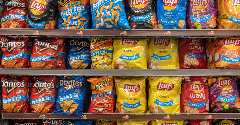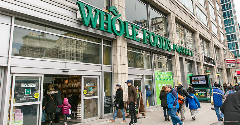News
Walmart and Flipkart invest $30M in Indian e-commerce platform
27 Oct 2020The U.S. retail giant Walmart and India’s grocery e-commerce company Flipkart (which is majority-owned by Walmart) invested for the second time this year in the Indian delivery startup Ninjacart. Although the companies did not disclose their financial commitment, The Economic Times reported that sources familiar with the deal cited a $30 million ballpark figure for the cash infusion.
Funding will be used to more closely forge a partnership between the companies and expand Ninjacart’s customer offerings and experience. The startup said it will work toward expanding its supply chains through enhanced, tech-driven efficiency, reliability, and profitability. It also plans to cater to emerging consumer segments.

Ninjacart is a delivery platform for restaurants, retailers and kiranas (small local shops) that are looking for fresh, local produce deliveries. The startup’s approach allows for competitive costs for both farmers and buyers due to its innovative analysis of demand and delivery networks that has enabled the creation of 12-hour delivery windows for most orders, thereby eliminating the need for complex and expensive cold chain infrastructure.
One of Ninjacart’s newest initiatives rolled out as a result of the pandemic, which has dramatically increased the popularity of e-commerce grocery in India, is the e-commerce startup's expansion of its delivery to apartments and housing societies. Additionally, in April, the ‘Harvest the Farm‘ initiative came online where Ninjacart buys excess produce from farmers at a nominal price and then delivers it absorbing “supply chain costs.”
Ninjacart also recently launched FoodPrint, a platform that allows traceability of all products on its platform to improve safety. This new program works by using an RFID process that tags produce at the point of harvest and tracks it to its final destination in order to provide buyers with a ‘farm-to-shelf’ traceability system.
Both Walmart and Flipkart previously invested in this startup in December last year to the tune of $10 million. Now with a $50 million commitment between the two large corporations, it does not appear that their interest in this startup will slow any time soon. “We will continue to make investments to offer the best produce to our customers and support livelihoods and sustainable growth for local farmers, producers and the supply chain ecosystem,” said Kalyan Krishnamurthy, CEO at Flipkart Group in a statement.
Related news

PepsiCo formulates ‘naked’ Cheetos and Doritos products
31 Dec 2025
US food giant PepsiCo has launched its Simply NKD range, a move it says reimagines its popular products with new formulations free from artificial flavours, dyes, and colours.
Read more
Debate over ban on ‘meaty’ names for plant-based products reaches stalemate
26 Dec 2025
The debate over a ban on plant-based products using “meaty” terms has reached a stalemate, leaving manufacturers in limbo and still facing overhauls to their marketing and packaging.
Read more
Has ‘clean’ had its day?
22 Dec 2025
Wielding clean-label positioning and fortification as marketing levers is a dangerous strategy, and brands would be better off explaining the hows and whys of the ingredients in their products, say experts.
Read more
Pioneers of circular plastic packaging push for new policies
18 Dec 2025
Some of the world’s largest food and drink companies have grown frustrated at investing in circular packaging systems, as the majority “wait on the sidelines”.
Read more
Whole Foods Market forecasts fibre frenzy for 2026
11 Dec 2025
Whole Foods Market has released its top 2026 trends, predicting that a fibre frenzy will take place next year as health-conscious consumers seek out nutritious, filling options.
Read more
Sorghum emerges as better-for-you hero ingredient
9 Dec 2025
With the launch of Novak Djokovic’s sorghum-based brand, the grain’s popularity in the better-for-you snacking sphere is on the rise, thanks to its nutritional and sensory properties.
Read more
Innovation promise in 'maturing' plant-based dairy alternatives market
8 Dec 2025
Plant-based dairy is a maturing market that still faces significant hurdles around taste, functionality, nutrition, and price, but industry is innovating fast, according to experts speaking at Fi Europe.
Read more
Turning global trade challenges into opportunities
4 Dec 2025
While our food innovation ecosystem is in a healthy place, certain barriers persist. A panel of experts at Fi Europe shared their ideas and strategies for overcoming these, to fully unleash Europe’s potential.
Read more
Celebrating the winners of the Fi Europe Innovation Awards 2025
3 Dec 2025
Food industry stakeholders celebrated as the winners of the Fi Europe Innovation Awards were announced at a ceremony in Paris.
Read more
Yuka’s food scanning app helps consumers make healthier choices
2 Dec 2025
Global food scanning app Yuka helps consumers understand the content of their shopping baskets and shapes producers’ reformulation plans.
Read more